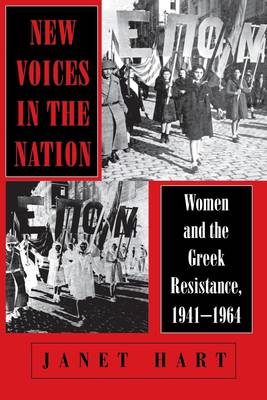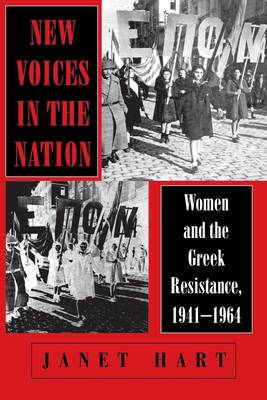
- Retrait gratuit dans votre magasin Club
- 7.000.000 titres dans notre catalogue
- Payer en toute sécurité
- Toujours un magasin près de chez vous
- Retrait gratuit dans votre magasin Club
- 7.000.0000 titres dans notre catalogue
- Payer en toute sécurité
- Toujours un magasin près de chez vous
Description
During World War II, movements organized to resist Nazi occupation grew throughout Europe. In Greece the resistance movement also involved an unprecedented opportunity for social and political change initiated by the largest organization, the National Liberation Front or EAM. Key leaders envisioned postwar Greece as a popular democracy structured to allow a range of new voices to be heard. Believing gender equality to be one of the hallmarks of modernity, they attempted to expand the category of "national citizen" to include women as well as men. Janet Hart describes, often in the words of the Greek women involved, how lives were transformed by active participation in the resistance against the Nazis and in the anticommunist aftermath of the war. Political action proved exhilarating for women who had grown up in a prewar world of narrowly constricted gender roles. Hart has interviewed many survivors, and their testimony transcends local boundaries to capture the experience of emancipation. New Voices in the Nation explores the historical memory of social transformation, finding in personal narrative a key to new conceptions of societal change. The author places the resistance movement in an international context by examining how the struggle to promote modern political culture among ordinary people took shape on the ground in the course of the battle against conquering Axis forces. Hart uses insights gleaned from former partisans, Italian leader and political philosopher Antonio Gramsci, histories of black consciousness, and her own perceptions as an African American to explore topics of compelling current concern: the relation between gender and political action, the role ofnationalism in the raising of gender-based consciousness, and the ways in which social movements, by challenging the political status quo, may ultimately find themselves targeted as threats to state equilibrium.
Spécifications
Parties prenantes
- Auteur(s) :
- Editeur:
Contenu
- Nombre de pages :
- 368
- Langue:
- Anglais
- Collection :
Caractéristiques
- EAN:
- 9780801430442
- Date de parution :
- 07-03-96
- Format:
- Livre relié
- Format numérique:
- Genaaid
- Dimensions :
- 161 mm x 238 mm
- Poids :
- 657 g

Les avis
Nous publions uniquement les avis qui respectent les conditions requises. Consultez nos conditions pour les avis.






